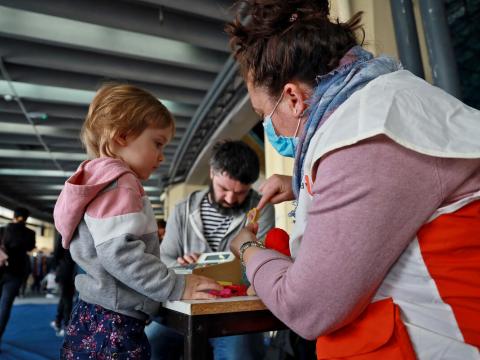Child Protection: 3 ways we can protect children in conflict zones.

The scenes of heartbreak, chaos and ruin from conflict are gut-wrenching. It’s hard not to feel helpless. But child sponsors have brought hope into some of humanity’s darkest hours from the very beginning, and we’re still doing it today. Here’s how.
From the very beginning, World Vision child sponsors have been people who wouldn’t look away when conflict and poverty devastated children and their communities. From our first work in post-war Korea and China in the 1950s to over 70 years of working in the world’s hardest places, we’ve seen the power of staying to help communities survive and recover from conflict and the impact of being there for the long haul.
When most of us think about sponsoring a child, we think of helping kids get to school, get clean water to drink and get health care when they are sick.
Sponsoring a child does do that. But it does even more in areas of conflict. When conflict strikes in communities where we work, these three things happen:
1) Immediate action for children, because we are already on the ground
Because child sponsorship is already working in the places where it’s toughest to be a child, we are on the ground when conflict erupts. Planning and preparing for potential emergencies, like conflicts, is part of all child sponsorship programmes and so we are positioned with existing local staff, local knowledge and local distribution networks to respond from the very first hours of a conflict. We harness the relationships, partnerships and trust we have built with governments, communities and individuals over years of working together to provide the fast and effective support they need, when they need it the most.
Right now, we are supporting vulnerable children in the West Bank by providing families affected by violence with emergency support to meet their urgent needs, helping communities with disaster risk reduction planning, and providing psychosocial support to children and caregivers. World Vision has one of the most extensive community-based presences among organisations in the West Bank, starting operations in the region in 1975, and sponsors’ long-term commitment to the region meant we were ready to respond immediately.
We have 90 dedicated staff in the West Bank and within the first month of the crisis we were able to reach more than 220,000 people with emergency assistance, including emergency support for internally displaced people, equipment like fire extinguishers and stretchers for communities, and first aid kits for health clinics. We are also responding in other areas affected by unrest within their borders or nearby like Lebanon, Albania, Myanmar, Sierra Leone, Niger, Uganda and Ethiopia, where displaced people and the communities they flee to need support.
2) Critical needs are met quickly, because we can immediately mobilise funds
When you sponsor a child, your gifts are always pooled with those of other sponsors supporting children in the same area. Pooling funds maximises impact by focusing resources on the most critical needs. In a humanitarian crisis like a conflict, these sponsorship funds can be combined with specific donations for the response, special grants and funding from government donors or other institutions to multiply our impact. When conflict breaks out, we can immediately direct part of sponsors’ pooled contributions to meeting the urgent, life-threatening needs of children and families in conflict zones. Sponsors’ support also provides longer-term support and care for those who flee conflict and arrive in communities where we are working.
3) Long-term support, because we will be there to help children recover
Even when the conflict is over, it can take nations decades to rebuild and recover. Sponsoring a child means you walk alongside a child and their community and support them as they break the cycle of poverty, for good. We partner with communities for the long run, usually 10 years or more, and with their country for even longer, to create lasting change. In Sierra Leone for example, we were there during the height of the civil war and we are still there 20 years later, continuing to work alongside communities in 25 areas to improve children’s health, nutrition, education and protection. We continue to work in Ugandan communities, supporting children and families who escaped violence and persecution in South Sudan. Sponsoring a child means that children and communities have the support they need not just to survive today, but to thrive in a better tomorrow.
Want to know more? Find out more about World Vision’s response to the crisis in the Middle East or sponsor a child – your support is needed now more than ever.